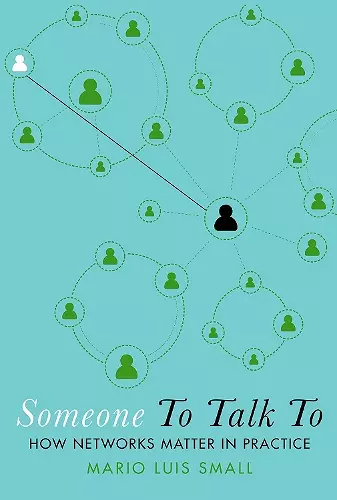Someone To Talk To
How Networks Matter in Practice
Format:Paperback
Publisher:Oxford University Press Inc
Published:25th Oct '19
Currently unavailable, and unfortunately no date known when it will be back
This paperback is available in another edition too:
- Hardback£39.99(9780190661427)

In Someone To Talk To, Mario Luis Small examines how individuals choose confidants during tough times, revealing surprising patterns in social support dynamics.
In Someone To Talk To, Mario Luis Small explores the intricate dynamics of social support among individuals grappling with various life challenges. Through the lens of a group of graduate students, he examines how factors such as stress, self-doubt, and personal relationships influence their decisions on whom to confide in. The narrative reveals that during difficult times, people often seek out connections that may not be as close as their immediate family or friends, challenging the common belief that strong ties are the go-to for support.
Small's research uncovers a fascinating trend: rather than leaning on their strongest relationships, many individuals prefer to reach out to 'weak ties'—acquaintances or even strangers. This shift highlights a profound need for understanding and empathy, which sometimes outweighs the apprehensions surrounding trust. The book illustrates how individuals navigate their social networks, often revealing unexpected confidants in their lives.
By grounding his findings in representative national data, Small not only enriches the narrative with empirical evidence but also invites readers to rethink their own social connections. Someone To Talk To ultimately challenges long-held assumptions about social networks, offering fresh insights into the ways we seek support and the complexities of our interpersonal relationships.
Small provides an excellent foray into the deeper social network question of who individuals talk to about issues important to them. Further, his critiques on commonly used methods are well founded and timely. I would highly recommend this book not just for social network analysts or sociologists but health professionals hoping to better understand the social influences that may impact health. * Tyler Prochnow, Baylor University, World Medical and Health Policy *
In Someone To Talk To, Mario Small roots social network analysis in the messy, contradictory, and fortuitous nature of human interaction. In this important study, Small shows, both through up-close interviews with young adults undergoing major life changes and with general surveys of Americans, that we find the help we need from all sorts of people-those to whom we are close, those who are just acquaintances, and even those whom we have just met. This is a valuable correction to the often overly abstract literature on social networks." * Claude S. Fischer, University of California, Berkeley *
The reality of who affects our lives through contact is much more complicated, messy, and sometimes even random than contemporary theory and methods suggest. This fascinating book taps into the complex, networked fabric of our lives, revealing ground truth." * Bernice Pescosolido, Indiana University *
In Someone To Talk To, Mario Small brings relations to life as solutions to problems that people face when they need a hand or an ear. The net we cast as we struggle with our anxieties and concerns is as wide and subtle as this book, which reminds us that our interactions with others are much more delicate than the clumsy representation of ties in graphs would suggest." * Peter Bearman, Columbia University *
Who you turn to when you want someone to talk to will surprise you. But whomever you talk to, you'll be talking about this book. It's extraordinary!" * Eldar Shafir, Princeton University *
Refreshing. Someone To Talk To is very readable, yet reflects deep theoretical and methodical advances in sociology. I think this book is a winner both for its theoretical and methodological achievements." * Nan Lin, Duke University *
Mario Small's book Someone to Talk To turns received wisdom on its head in several ways - reorienting us to the role of weak ties in contrast to strong ones, moving us beyond network structure to practices and norms embedded in the networks we inhabit, and focusing our attention on empathy and the ways in which we find it. The book is a tour de force." * Karen S. Cook, Stanford University *
ISBN: 9780190090432
Dimensions: 155mm x 231mm x 18mm
Weight: 431g
296 pages